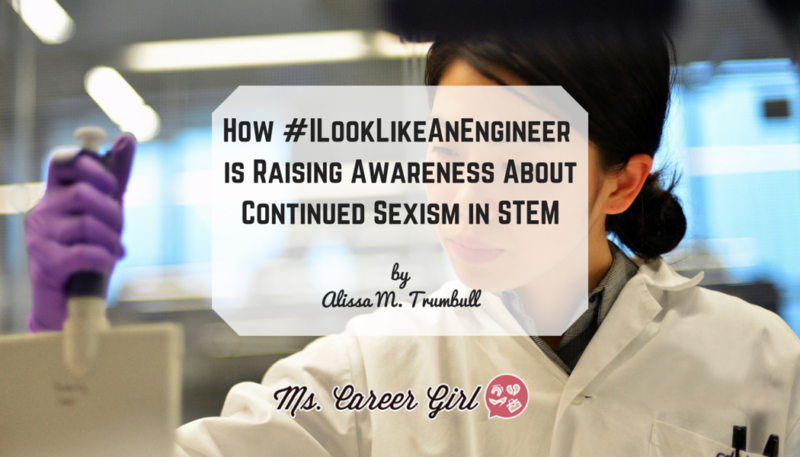#ILookLikeAnEngineer Brings Awareness to Sexism in STEM Fields

Are you aware of the latest sexism debate concerning gender inequality in the STEM fields?

If you’re active on social media, I’m sure you’ve seen that the hashtag #ILookLikeAnEngineer quickly became trending on Twitter after OneLogin began a campaign in San Francisco geared at all engineers. However, their advertisement pictured below featured female employee Isis Wenger received serious backlash. In response, Ms. Wenger took to Medium with a poignant article calling on not just women, but both genders to participate in her new #ILookLikeAnEngineer campaign.
And, yes, it’s true, women in STEM (Science, Technology, Engineering, and Math) are still scraping their way up the ranks and receiving sexist push-back while it happens – even after major advancements over the centuries by women like Marie Curie, Rosalind Franklin, Valentina Tereshkova, and Frances Allen. I’m sure we can all think back to earlier this summer when Sir Tim Hunt commented,
“Let me tell you about my trouble with girls. Three things happen when they are in the lab. You fall in love with them, they fall in love with you, and when you criticize them, they cry.”
The ensuing backlash on Twitter from scientists
This comment was met with a series of #DistractinglySexy posts from scientists across the globe (some of the best are gathered here), a campaign that has gained new momentum since Ms. Wenger’s advertisement debuted.
The support from women to each other, STEM companies and institutions, and male counterparts who see the blatant disparity in these fields is heartening.
People are banding together to support one another and share their stories. There has been an outpour of online support. A site aggregating photos using the #ILookLikeAnEngineer hashtag has already collected close to 40,000 photographs – mostly of women – highlighting pride and showing diversity in the engineering field. Ms. Wenger herself has tweeted out a call for collaboration and is asking people looking to work together on this issue to email her at isis@ilooklikeanengineer.com.
What about offline?
Jaymini Mistry, a quality engineer in Nottingham, United Kingdom realizes that this support needs to take itself offline, too. She notes,
“I personally find the best way to support women in STEM is to treat them how you would treat any male working in STEM. Actively approach women the same way you would approach men. If the way you would normally approach men at work might seem inappropriate for women, you should probably rethink your approach in general!”
Beyond the incidents with Mr. Hunt and Ms. Wenger, sexism in STEM fields still seems to be a pervasive issue. Sarah Cueto, a fellow Ms. Career Girl columnist who holds a degree in Neurobiology, Physiology, and Behavior from UC Davis and currently works in the biotech industry told me,
“I think [this] cause is important. I think that sexism is latent in our society. I experience it at work, and it’s so ingrained that people don’t even KNOW they are doing it. I notice it on pretty much a daily basis.”
How to continue the debate?
It is up to us to continue the conversations that begin when these fires are sparked and to keep the energy moving by taking real steps to combat discrimination. It is easy for the flames on social media to burn bright and then extinguish almost faster than they began. Ms. Cueto says,
“As far as what we can do to keep the momentum going…I think that it begins with our actions. We have to speak up. Call it as we see it and voice our feelings when we witness it happening to ourselves or others.”
Social media has proven to be a strong platform for exposing latent sexism and other issues of discrimination. It is how we continue these movements offline that will allow for positive changes to be made and help us truly attain parity.

